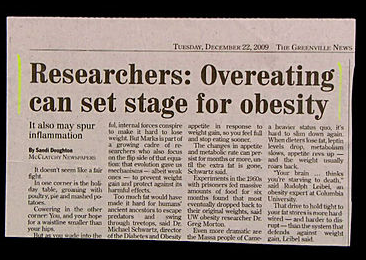
Most of my mornings start off the same way – a cup of tea, a bowl of oatmeal, and the front section of the newspaper.
Now I would expect a science story which makes the front section to be big – a groundbreaking development or discovery. But recently I read a story which, essentially, told me that people who smoked had less money to spend on other things1. Well, duh! I thought. Why had anybody bothered doing a study with such a seemingly obvious outcome?
When You Make Assumptions...
Well first of all, what we think is obvious is sometimes anything but. Centuries ago, it was perfectly obvious that the Earth was flat – all you had to do was look out at the horizon. It took careful observations and measurements by people willing to challenge the obvious to discover that the Earth is actually round.

Science and scientists can’t afford to make or accept assumptions about the way the world works. In science, each step forward builds on what has come before. And in science, just as in construction, you need to have a solid foundation to build on. That means establishing your base facts by testing them, no matter how obvious they seem at first glance. This way, you don’t have to worry about your theories (and reputation!) crashing down on you further down the road.
The Devil’s in the Details
Even when what “everybody” knows turns out to be true, popular knowledge may be lacking in important details. I may know that mixing alcohol and drugs is a bad idea, but that doesn’t mean I know why. And the “why” of something can be very important. Any effects of mixing drugs and alcohol that are not easily observed, such as changes to blood chemistry, will go undetected unless somebody conducts research to look for them. But knowledge of these effects can be crucial for treating addiction or overdoses.
Making Changes
Doing research can also help give a sense of scale to a problem. Everyone knows that drinking and driving is a bad idea, and everyone knows that you’re more likely to be in an accident if you do it. But researching drinking and driving can quantify the problem; it can give you a sense of how often it is happening and what the costs to society are. Attaching numbers to a problem can help local, provincial or federal governments decide what kind of action they need to take to solve it.
In fact, collecting enough evidence to convince people to make changes is one of the biggest reasons we see so much “obvious” research. When people first began smoking modern cigarettes, nobody knew that they could cause cancer – in fact, cigarettes were thought to be good for you! Although evidence linking cigarettes and cancer has been piling up steadily since the 1930’s2, rates of tobacco use are still high.
Not Just Repetition
The mountain of papers showing yet another aspect of why smoking tobacco is bad for you is not just a series of repetitive, obvious research. These studies force us to acknowledge that there is a problem, and a pretty big one at that. Only then can we put our minds to finding solutions.
